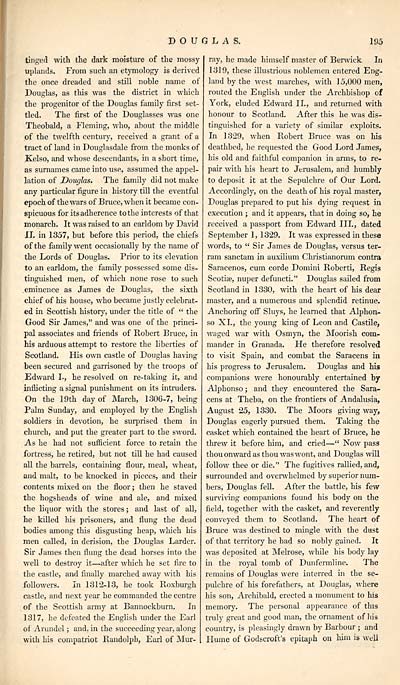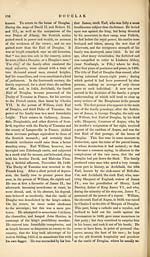Gazetteer of Scotland > Volume 1
(223) Page 195
Download files
Complete book:
Individual page:
Thumbnail gallery: Grid view | List view

DOUGLAS.
195
tinged with the dark moisture of the mossy
uplands. From such an etymology is derived
the once dreaded and still noble name of
Douglas, as this was the district in which
the progenitor of the Douglas family first set-
tled. The first of the Douglasses was one
Theobald, a Fleming, who, about the middle
of the twelfth century, received a grant of a
tract of land in Douglasdale from the monks of
Kelso, and whose descendants, in a short time,
as surnames came into use, assumed the appel-
lation of Douglas. The family did not make
any particidar figure in history till the eventful
epoch of the wars of Bruce, when it became con-
spicuous for its adherence to the interests of that
monarch. It was raised to an earldom by David
II. in 1357, but before this period, the chiefs
of the family went occasionally by the name of
the Lords of Douglas. Prior to its elevation
to an earldom, the family possessed some dis-
tinguished men, of which none rose to such
.eminence as James de Douglas, the sixth
chief of his house, who became justly celebrat-
ed in Scottish history, under the title of " the
Good Sir James," and was one of the princi-
pal associates and friends of Robert Bruce, in
bis arduous attempt to restore the liberties of
Scotland. His own castle of Douglas having
been secured and garrisoned by the troops of
Edward L, he resolved on re-taking it, and
inflicting a signal punishment on its intruders.
On the 19th day of March, 1306-7, being
Palm Sunday, and employed by the English
soldiers in devotion, he surprised them in
church, and put the greater part to the sword.
As he had not sufficient force to retain the
fortress, he retired, but not till he had caused
all the barrels, containing flour, meal, wheat,
and malt, to be knocked in pieces, and their
contents mixed on the floor; then he staved
the hogsheads of wine and ale, and mixed
the liquor with the stores ; and last of all,
he killed his prisoners, and flung the dead
bodies among this disgusting heap, which his
men called, in derision, the Douglas Larder.
Sir James then flung the dead horses into the
well to destroy it — after which he set fire to
the castle, and finally marched away with his
followers. In 1312-13, he took Roxburgh
castle, and next year he commanded the centre
of the Scottish army at Bannockburn. In
1317, he defeated the English under the Earl
of Arundel ; and, in the succeeding year, along
with his compatriot Randolph, Earl of Mur-
ray, he made himself master of Berwick In
1319, these illustrious noblemen entered Eng-
land by the west marches, with 15,000 men,
routed the English under the Archbishop of
York, eluded Edward II., and returned with
honour to Scotland. After this he was dis-
tinguished for a variety of similar exploits.
In 1329, when Robert Bruce was on his
deathbed, he requested the Good Lord James,
his old and faithful companion in arms, to re-
pair with his heart to Jerusalem, and humbly
to deposit it at the Sepulchre of Our Lord.
Accordingly, on the death of his royal master,
Douglas prepared to put his dying request in
execution ; and it appears, that in doing so, he
received a passport from Edward III., dated
September 1, 1329. It was expressed in these
words, to " Sir James de Douglas, versus ter-
ram sanctam in auxilium Christianorum contra
Saracenos, cum corde Domini Roberti, Regis
Scotiae, nuper defuncti." Douglas sailed from
Scotland in 1330, with the heart of his dear
master, and a numerous and splendid retinue.
Anchoring off Sluys, he learned that Alphon-
so XL, the young king of Leon and Castile,
waged war with Osmyn, the Moorish com-
mander in Granada. He therefore resolved
to visit Spain, and combat the Saracens in
his progress to Jerusalem. Douglas and his
companions were honourably entertained by
Alphonso ; and they encountered the Sara-
cens at Theba, on the frontiers of Andalusia,
August 25, 1330. The Moors giving way,
Douglas eagerly pursued them. Taking the
casket which contained the heart of Brace, he
threw it before him, and cried — " Now pass
thou onward as thou was wont, and Douglas will
follow thee or die." The fugitives rallied, and,
surrounded and overwhelmed by superior num-
bers, Douglas fell. After the battle, his few
surviving companions found his body on the
field, together with the casket, and reverently
conveyed them to Scotland. The heart of
Bruce was destined to mingle with the dust
of that territory he had so nobly gained. It
was deposited at Melrose, while his body lay
in the royal tomb of Dunfermline. The
remains of Douglas were interred in the se-
pulchre of his forefathers, at Douglas, where
his son, Archibald, erected a monument to his
memory. The personal appearance of this
truly great and good man, the ornament of his
country, is pleasingly drawn by Barbour ; and
Hume of Godscroft's epitaph on him is well
195
tinged with the dark moisture of the mossy
uplands. From such an etymology is derived
the once dreaded and still noble name of
Douglas, as this was the district in which
the progenitor of the Douglas family first set-
tled. The first of the Douglasses was one
Theobald, a Fleming, who, about the middle
of the twelfth century, received a grant of a
tract of land in Douglasdale from the monks of
Kelso, and whose descendants, in a short time,
as surnames came into use, assumed the appel-
lation of Douglas. The family did not make
any particidar figure in history till the eventful
epoch of the wars of Bruce, when it became con-
spicuous for its adherence to the interests of that
monarch. It was raised to an earldom by David
II. in 1357, but before this period, the chiefs
of the family went occasionally by the name of
the Lords of Douglas. Prior to its elevation
to an earldom, the family possessed some dis-
tinguished men, of which none rose to such
.eminence as James de Douglas, the sixth
chief of his house, who became justly celebrat-
ed in Scottish history, under the title of " the
Good Sir James," and was one of the princi-
pal associates and friends of Robert Bruce, in
bis arduous attempt to restore the liberties of
Scotland. His own castle of Douglas having
been secured and garrisoned by the troops of
Edward L, he resolved on re-taking it, and
inflicting a signal punishment on its intruders.
On the 19th day of March, 1306-7, being
Palm Sunday, and employed by the English
soldiers in devotion, he surprised them in
church, and put the greater part to the sword.
As he had not sufficient force to retain the
fortress, he retired, but not till he had caused
all the barrels, containing flour, meal, wheat,
and malt, to be knocked in pieces, and their
contents mixed on the floor; then he staved
the hogsheads of wine and ale, and mixed
the liquor with the stores ; and last of all,
he killed his prisoners, and flung the dead
bodies among this disgusting heap, which his
men called, in derision, the Douglas Larder.
Sir James then flung the dead horses into the
well to destroy it — after which he set fire to
the castle, and finally marched away with his
followers. In 1312-13, he took Roxburgh
castle, and next year he commanded the centre
of the Scottish army at Bannockburn. In
1317, he defeated the English under the Earl
of Arundel ; and, in the succeeding year, along
with his compatriot Randolph, Earl of Mur-
ray, he made himself master of Berwick In
1319, these illustrious noblemen entered Eng-
land by the west marches, with 15,000 men,
routed the English under the Archbishop of
York, eluded Edward II., and returned with
honour to Scotland. After this he was dis-
tinguished for a variety of similar exploits.
In 1329, when Robert Bruce was on his
deathbed, he requested the Good Lord James,
his old and faithful companion in arms, to re-
pair with his heart to Jerusalem, and humbly
to deposit it at the Sepulchre of Our Lord.
Accordingly, on the death of his royal master,
Douglas prepared to put his dying request in
execution ; and it appears, that in doing so, he
received a passport from Edward III., dated
September 1, 1329. It was expressed in these
words, to " Sir James de Douglas, versus ter-
ram sanctam in auxilium Christianorum contra
Saracenos, cum corde Domini Roberti, Regis
Scotiae, nuper defuncti." Douglas sailed from
Scotland in 1330, with the heart of his dear
master, and a numerous and splendid retinue.
Anchoring off Sluys, he learned that Alphon-
so XL, the young king of Leon and Castile,
waged war with Osmyn, the Moorish com-
mander in Granada. He therefore resolved
to visit Spain, and combat the Saracens in
his progress to Jerusalem. Douglas and his
companions were honourably entertained by
Alphonso ; and they encountered the Sara-
cens at Theba, on the frontiers of Andalusia,
August 25, 1330. The Moors giving way,
Douglas eagerly pursued them. Taking the
casket which contained the heart of Brace, he
threw it before him, and cried — " Now pass
thou onward as thou was wont, and Douglas will
follow thee or die." The fugitives rallied, and,
surrounded and overwhelmed by superior num-
bers, Douglas fell. After the battle, his few
surviving companions found his body on the
field, together with the casket, and reverently
conveyed them to Scotland. The heart of
Bruce was destined to mingle with the dust
of that territory he had so nobly gained. It
was deposited at Melrose, while his body lay
in the royal tomb of Dunfermline. The
remains of Douglas were interred in the se-
pulchre of his forefathers, at Douglas, where
his son, Archibald, erected a monument to his
memory. The personal appearance of this
truly great and good man, the ornament of his
country, is pleasingly drawn by Barbour ; and
Hume of Godscroft's epitaph on him is well
Set display mode to: Large image | Transcription
Images and transcriptions on this page, including medium image downloads, may be used under the Creative Commons Attribution 4.0 International Licence unless otherwise stated. ![]()
| Gazetteers of Scotland, 1803-1901 > Gazetteer of Scotland > Volume 1 > (223) Page 195 |
|---|
| Permanent URL | https://digital.nls.uk/97427038 |
|---|
| Description | Volume I: Abbey to Glenartney. |
|---|---|
| Attribution and copyright: |
|
| Description | By Robert Chambers and William Chambers. Glasgow: Blackie & Son, 1838. 2 volumes. |
|---|---|
| Shelfmark | NF.1461.g.7 |
| Additional NLS resources: | |

